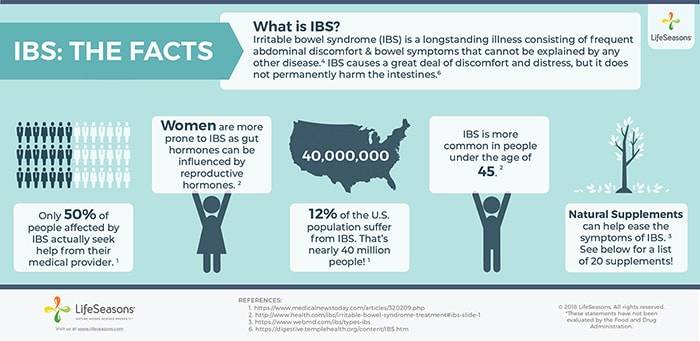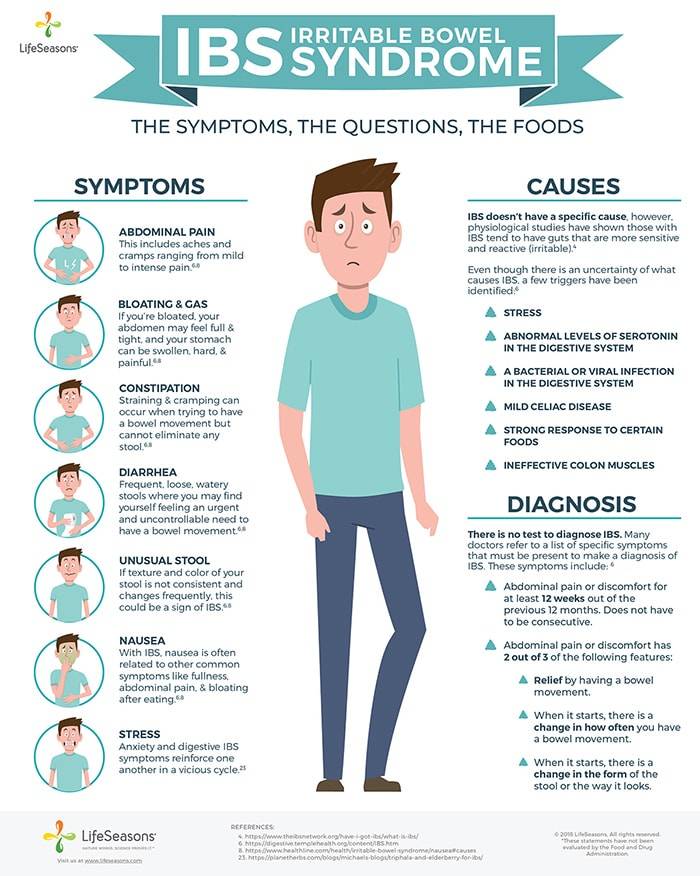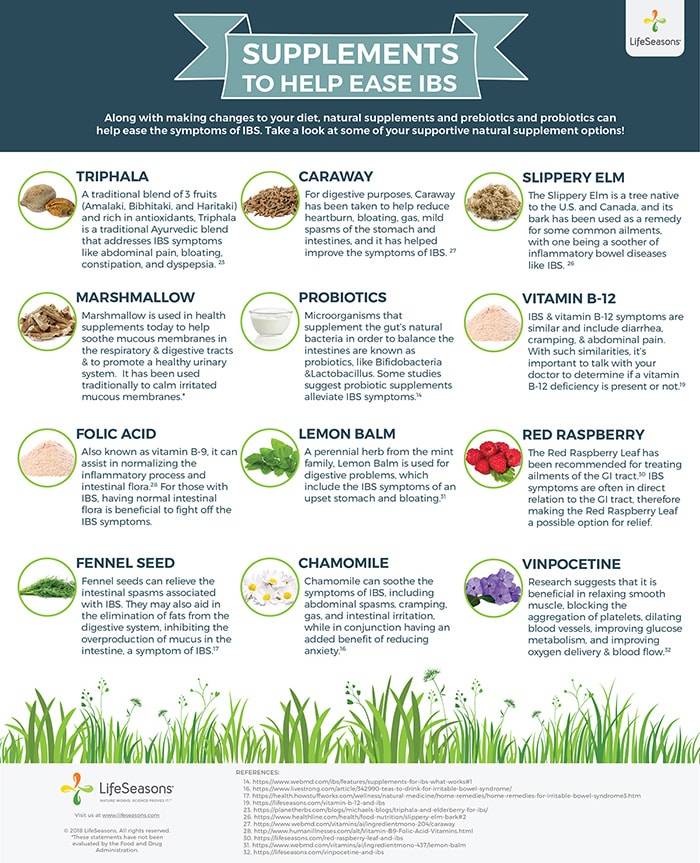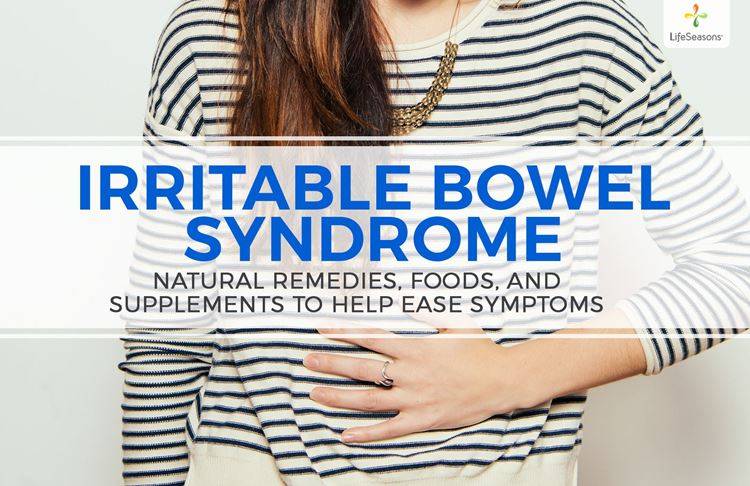Did you know there’s a syndrome sweeping across the U.S. in which only 50% of the affected people actually seek help from their medical provider?1
font_0 It’s called IBS – Irritable Bowel Syndrome, and around 12% of the U.S. population (that’s nearly 40 million people!) suffer from the discomfort and sometimes embarrassing symptoms that surround this condition.1 IBS is more common in people under the age of 45. And sorry, ladies, but you’re more prone to it because gut hormones can be influenced by reproductive hormones.2

And, did you know that there is an IBS ingredient, known as Quercetin, that can bring some relief to a gut in distress? With six leading IBS symptoms – diarrhea, constipation, gas, bloating, nausea, and stress – Quercetin could help with the three forms of IBS: IBS-D, IBS-C, and IBS-A, which stands for with Diarrhea, with Constipation, and with Alternating constipation and diarrhea.3
In this article, you’ll learn all about IBS. Your most common questions about IBS will be answered, and this includes learning what foods are good and what foods you should avoid. When it comes to IBS, diet is important!
What is IBS?

As a chronic gastrointestinal and functional disorder, irritable bowel syndrome (IBS) is the name given to a longstanding illness consisting of frequent abdominal discomfort and bowel symptoms that cannot be explained by any other disease.4 It’s considered a functional disorder because the colon shows no evidence of disease.5
IBS causes a great deal of discomfort and distress, but it doesn’t permanently harm the intestines and does not lead to a serious disease, such as cancer.6 Fortunately, most people can control their symptoms with diet, stress management, and prescribed medications, although for some people, it can be disabling. Those with IBS frequently suffer from depression and anxiety, which can worsen symptoms. Similarly, the symptoms associated with IBS can cause a person to feel depressed and anxious.6
What Causes IBS?
Unfortunately, IBS doesn’t have a specific cause, and therefore, there isn’t one specific treatment. However, physiological studies have shown those with IBS tend to have guts that are more sensitive and reactive (irritable).4 Causes of this may include a traumatic or upsetting event or situation or an attack of gastroenteritis. Although, it’s also thought that IBS may be a result from a combination of abnormal gastrointestinal (GI) tract movements, increased awareness of bodily functions, and a disruption in the communication between the brain and the GI tract.7
font_0 Even though there is an uncertainty of what causes IBS, a few triggers have been identified:6
- Stress
- Abnormal levels of serotonin in the digestive system
- A bacterial or viral infection in the digestive system
- Mild celiac disease
- Strong response to certain foods
- Ineffective colon muscles
IBS vs IBD – What’s the Difference?
Sometimes IBS is thought to be the same as IBD, which is inflammatory bowel disease, but please know that IBS and IBD are two completely different conditions. IBD is a more serious condition than IBS, and it causes inflammation in the digestive tract and can result in severe complications, such as ulcers, Crohn’s Disease and Ulcerative Colitis.5,7
What are the Signs of IBS?
IBS symptoms vary from person to person, but abdominal pain, bloating, and discomfort are the main symptoms. Let’s take a look at these symptoms, plus a few others, in further detail:6,8
ABDOMINAL PAIN
This includes aches and cramps ranging from mild to intense pain.
BLOATING & GAS
If you’re bloated, you’re likely to feel a full and tight abdomen, and your stomach might be swollen, hard, and painful.
CONSTIPATION
Infrequent bowel movements or difficult bowel movements are signs of constipation. Straining and cramping can occur when trying to have a bowel movement but cannot eliminate any stool.
DIARRHEA
This is frequent, loose, watery stools where you might find yourself feeling an urgent and uncontrollable need to have a bowel movement.
UNUSUAL STOOL
If the texture and color of your stool are not consistent and changes frequently, this could be a sign of IBS. It’s been reported of cases of IBS that the stool may be coated in mucus.
NAUSEA
In people who have IBS, nausea is often related to other common symptoms like fullness, abdominal pain, and bloating after eating. While not always the case, IBS nausea can occur most often after certain foods trigger your symptoms.
STRESS
It’s unclear whether IBS symptoms are an expression of mental stress or whether the stress of living with IBS makes people more prone to psychological difficulties. Whichever comes first, anxiety and digestive IBS symptoms reinforce one another in a vicious cycle.23
IBS Diagnosis: Is there an IBS Test?
Unfortunately, there is no test to diagnose IBS. Instead, IBS is diagnosed by exclusion, which means a doctor considers other alternatives first, performing tests to rule out other medical problems. According to Temple University Hospital Digestive Disease Center, doctors may diagnose IBS based on your symptoms, including how often you have had abdominal pain or discomfort during the past year, when the pain starts and stops in relation to bowel function, and how your bowel frequency and stool consistency have changed:6
Many doctors refer to a list of specific symptoms that must be present to make a diagnosis of IBS. These symptoms include:6
- Abdominal pain or discomfort for at least 12 weeks out of the previous 12 months. These 12 weeks do not have to be consecutive.
- The abdominal pain or discomfort has two of the following three features:
- It is relieved by having a bowel movement. When it starts, there is a change in how often you have a bowel movement.
- When it starts, there is a change in the form of the stool or the way it looks.
If your digestive discomfort or pain is noticeably frequent, talk with your doctor to see if you could have IBS.
How to Treat IBS

Although there isn’t a cure for IBS, there are both natural and medicinal treatments for symptom relief of IBS. Medicinal treatments can cause unwanted side effects, so going the natural treatment route is usually suggested first.8 Take a look at these three natural remedies:
- EXERCISE
You’ve heard over and over again the countless ways that exercise benefits you, and helping to relieve IBS is yet another way. Overall, exercise can help with digestive health; furthermore, a study done in 2011 found that increased physical activity improves GI symptoms in IBS.9 In addition, it was found that physically active patients with IBS will face less symptom deterioration compared with physically inactive patients, and it was concluded that physical activity should be used as a primary modality treatment in IBS.9 - REDUCE STRESS
Stress is hard on our bodies, so it’s not really a surprise that it can also affect our digestion, especially because it can stimulate colon spasms in people with IBS.6 Stress can also cause inflammation and impact hormone levels, which can play havoc on our digestion.11 According to WebMD, stress, anxiety, do not cause irritable bowel syndrome, but can aggravate the symptoms of IBS.10 When a doctor talks to people with this digestive disorder, “what you find is that about 60% of IBS patients will meet the criteria for one or more psychiatric disorders.”10 Reduce your stress, and your digestion could reap the benefits. Great ways to relieve stress include walking, yoga, meditation, and adequate sleep. - CHANGE YOUR DIET
Certain foods can trigger or worsen diarrhea, bloating and gas such as cruciferous vegetables (e.g. cauliflower, wasabi, kale, and broccoli), and legumes (e.g. black beans, edamame, soy nuts, and fava beans).7 Some people find that dairy, alcohol, spicy foods, and gluten-filled foods flare up IBS symptoms too. Consider keeping a food journal to jot down foods that seem to cause your distress. This is a good way to recognize eating patterns that could be causing IBS flare-ups.Another change in your diet has to do with the amount of food at each meal. Large meals can cause cramping and diarrhea, so eating smaller meals more often, or eating smaller portions, may help IBS symptoms.6 You can also check out Positive Health Wellness’ ultimate list of foods that cause IBS.
Living with IBS: An IBS Diet is Key to Lessening Symptoms
WHAT TO EAT?
As mentioned previously, a change in your diet could be essential to reducing IBS symptoms. So, what are the good foods to eat, and what are the bad foods to avoid? What should your IBS diet look like?

For an IBS diet, good foods for easy digestion include:12,33
- FRUIT
Keep it within moderations, and try fruits without the skins. - VEGETABLES
Specifically, non-starchy vegetables that are cooked or steamed, except perhaps cabbage, cauliflower, and broccoli – which might cause too much gas. - MEAT, CHICKEN, & FISH
Prepare foods by grilling, broiling, baking, or steaming with little to no oil (try using a cooking spray in place of oil), and eat in moderation. - DAIRY
Usually, dairy products don’t cause any problems for those with IBS, unless they also have a lactose intolerance. However, you should consider low-fat or non-fat dairy. Yogurt is a great choice due to its probiotic properties that help digestion. At times dairy can be a challenge to digest, so don’t overindulge – listen to your body. - GLUTEN-FREE FOODS
Breads and pastas can be found in gluten-free versions, so if you’re a die-hard lover of products with wheat, just search out the gluten-free versions.
For an IBS diet, bad foods to avoid include:12,33
- GLUTEN
Eliminate barley, rye, and wheat because they can cause distress to your digestion process. - FRIED FOODS
With its high-fat content, it can prove challenging for people with IBS. Also, when foods are fried, the chemical makeup of the food is changed and can make it more difficult to digest. - BEANS
Increasing gas, bloating, and cramps, beans can definitely antagonize IBS symptoms. - CAFFEINATED DRINKS
The stimulating effect on the intestines that caffeine causes can trigger IBS symptoms. - PROCESSED FOODS
The additives and preservatives could cause IBS symptom flare-ups. - SPICY FOODS
It’s no secret that spicy foods can be rough on the healthiest stomach, so if you’re already prone to digestive problems, definitely stay away from spicy foods. - CHOCOLATE
The high concentration of caffeine and sugar can trigger IBS symptoms, especially constipation. - ALCOHOL
Because of the way the body digests alcohol, there is a strong change that IBS symptoms will increase.

20 Supplements to Ease IBS Symptoms
Along with making changes to your diet, natural supplements and prebiotics and probiotics can help ease the symptoms of IBS. Take a look at allyour supportive natural supplement options!
- QUERCETIN
Some IBS sufferers have an allergic reaction in their guts to certain foods, and this causes a release of histamines into the intestines. Due to Quercetin’s antihistamine effects, it could help with the reduction of histamines found in the intestines and colon.13 - PROBIOTICS
Microorganisms that supplement the gut’s natural bacteria in order to balance the intestines are known as probiotics, like Bifidobacteria and Lactobacillus, and some studies suggest that probiotic supplements alleviate IBS symptoms.14 - DIGESTIVE ENZYMES
These enzymes are complex proteins that will help with nutrient absorption by breaking down food into smaller molecules.24 Because digestive enzymes assist with the breakdown of food, digestive enzymes supplements might help alleviate common IBS symptoms, such as diarrhea, constipation, bloating, and gas.24 If you want to take a digestive enzyme supplement, do a little research on the supplier because some supplements are made from a pig or cow source, while some others come from yeast; these factors might be important in your decision process.24 - CHAMOMILE
A non-caffeinated tea, chamomile can soothe the symptoms of IBS, including abdominal spasms, cramping, gas, and intestinal irritation, while in conjunction having an added benefit of reducing anxiety.16 It’s important to have non-caffeinated drinks because caffeine can trigger IBS symptoms.25 - FENNEL SEEDS
These seeds, which can be found as fennel tea, can relieve the intestinal spasms associated with IBS. They may also aid in the elimination of fats from the digestive system, inhibiting the overproduction of mucus in the intestine, which is a symptom of IBS.17 - BROMELAIN
Because Bromelain contains enzymes that digest protein, it can counteract inflammation of the intestinal lining, and it’s used as a digestive aid, both benefits to those with IBS.18 An excellent source of Bromelain is the pineapple, as that’s where Bromelain comes from. - VITAMIN B12
IBS and vitamin B-12 symptoms are similar and include diarrhea, cramping, and abdominal pain. With such similarities, it’s important to talk with your doctor to determine if a vitamin B-12 deficiency is present or not. If IBS related diarrhea is occurring, a decrease in vitamin B-12 may occur, and with lower B-12 levels, your metabolism process of carbs, fats, and proteins is adversely affected.19 Having a smooth metabolism process could help ease IBS symptoms. - ALOE VERA
Being a prebiotic, which enhances the function of probiotics, aloe vera and probiotics are frequently used together to treat constipation and alleviate digestive problems associated with IBS.20 When a prebiotic and probiotic join together, they form a synbiotic. It’s thought that synbiotics provide more benefits than if either component was used alone. Therefore, combining Aloe Vera and probiotics may be better for your digestive tract than if you were to use either by themselves.20 - FIBER
We’ve all heard how fiber is important for good digestion. If you’re having digestive IBS symptoms, like constipation or diarrhea, fiber could help. However, it’s important that you know what kind of fiber to have. If you have constipation, then you need to take an insoluble fiber, which acts as a laxative. On the other hand, if you have diarrhea, then you need to take a soluble fiber, which removes excess fluid in the digestive tract by attracting water and forming a gel that moves extremely slowly down your digestive tract.14 - SLIPPER ELM BARK
The Slippery Elm is a tree native to the U.S. and Canada, and its bark has been used as a remedy for some common ailments, with one being a soother of inflammatory bowel diseases like IBS.26 It soothes the lining of the stomach and intestines and reduces irritation. Preliminary clinical research suggests that taking a specific formulation containing slippery elm inner bark, lactulose, oat bran, and licorice root can improve stool frequency by 20% and reduce abdominal pain and bloating in people with constipation-predominant IBS compared to baseline.5 - FISH OIL
The omega-3 fatty acids found in fish oil reduces inflammation in the GI tract. If there is an imbalance of these fatty acids (known as EPA and DHA) in your body, it can contribute to inflammation in your gut and IBS symptoms. However, fish oil can cause unwanted side effects in your digestive system, including bloating, flatulence, belching, indigestion, heartburn, abdominal pain, and diarrhea.15 To help minimize possible side effects, take the fish oil with meals and start with a low dose.15 - TURMERIC
Turmeric has been known to have healing properties that come from curcumin, which is an anti-inflammatory compound found within it. Fortunately, turmeric has been associated with benefits for disorders of the digestive system, and it has shown promise in initial studies for its positive effect on some IBS symptoms. People with diabetes should avoid Turmeric because it can lower blood glucose levels, and it could interact negatively with blood thinners.21 - PEPPERMINT OIL
When combined with caraway oil, peppermint oil inhibits the excessive contraction of the intestinal smooth muscle and is useful in cases of IBS. Because it can reduce abdominal spasms or involuntary movement of the gut, symptoms of IBS (specifically pain, bloating, diarrhea, and gas) can be reduced or eliminated.21 - TRIPHALA
A traditional blend of 3 fruits (Amalaki, Bibhitaki, and Haritaki) and rich in antioxidants, Triphala is a traditional Ayurvedic blend that addresses IBS symptoms like abdominal pain, bloating, constipation, and dyspepsia. Unlike many laxatives, which can be habit forming, Triphala does not cause the gut to get dependent on the herb. Though if you have D-IBS (diarrhea-predominant IBS), the herb should not be used due to its laxative qualities.23 - CARAWAY
The Caraway plant and its oil, fruit, and seeds are used for medicinal purposes. For digestive purposes, Caraway has been taken to help reduce heartburn, bloating, gas, and mild spasms of the stomach and intestines, and it has helped improve the symptoms of IBS.27 - FOLIC ACID
Also known as vitamin B-9, can assist in normalizing the inflammatory process and intestinal flora. Intestinal flora are what the “good” bacteria, fungi, protozoa, and yeast found in our bodies are called, and they may help in food digestion by breaking down proteins..28 For those with IBS, having normal intestinal flora is beneficial to fight off the IBS symptoms. - VITAMIN D3
The D3 vitamin has been known for its support of bone health, immune function, and mental health. In addition to those health benefits, it’s also supportive of gut health. Research has suggested the possible benefits of Vitamin D3 on IBS symptoms, which include easing abdominal pain, bloating, diarrhea, and constipation, and was shown to have the most benefit on quality of life for those with IBS.29 - RED RASPBERRY LEAF
Abundant in magnesium, potassium, iron, vitamin C and B, the Red Raspberry Leaf has been used for medicinal purposes over the centuries. Found within medical literature, the Red Raspberry Leaf has been recommended for treating ailments of the GI tract.30 IBS symptoms are often in direct relation to the GI tract, therefore making the Red Raspberry Leaf a possible option for relief. - LEMON BALM
A perennial herb from the mint family, Lemon Balm is used for digestive problems, which include the IBS symptoms of an upset stomach and bloating. Early evidence suggests that adding 30 drops of a product containing lemon balm, spearmint and coriander three times daily after meals can reduce stomach pain and discomfort in people with IBS.31 - VINPOCETINE
Used as a drug in Eastern Europe, Vinpocetine is a derivative of an organic compound found in the periwinkle plant, and although it is most commonly known for enhancing memory and cognitive function, research suggests that it’s also beneficial in relaxing smooth muscle, blocking the aggregation of platelets, increasing production of ATP, dilating blood vessels, improving glucose metabolism, improving oxygen delivery, and improving blood flow.32
With over 20 standalone supplement ingredients, benefits have been shown through research that these natural vitamins, herbs, enzymes, and blended formulas target irritable bowels to help relieve, reduce, and prevent IBS symptoms.
font_0 Let’s face it – nobody wants to suffer from IBS. But if you are, the good news is that you can win the battle between you and the symptoms naturally. With some changes in your diet, reducing stress, and adding in natural supplements, your days of digestive distress will be a thing of the past.
We’d love for you to share any tips you have living with Irritable Bowel Syndrome. Share with the LifeSeasons community and support our belief that knowledge is power and our community our life source.
Feed Your Curiosity
If you want to be the first to know about new posts from our blog, join our email list to receive updates with helpful tips for living a healthy life.
IBS References
22. <a










